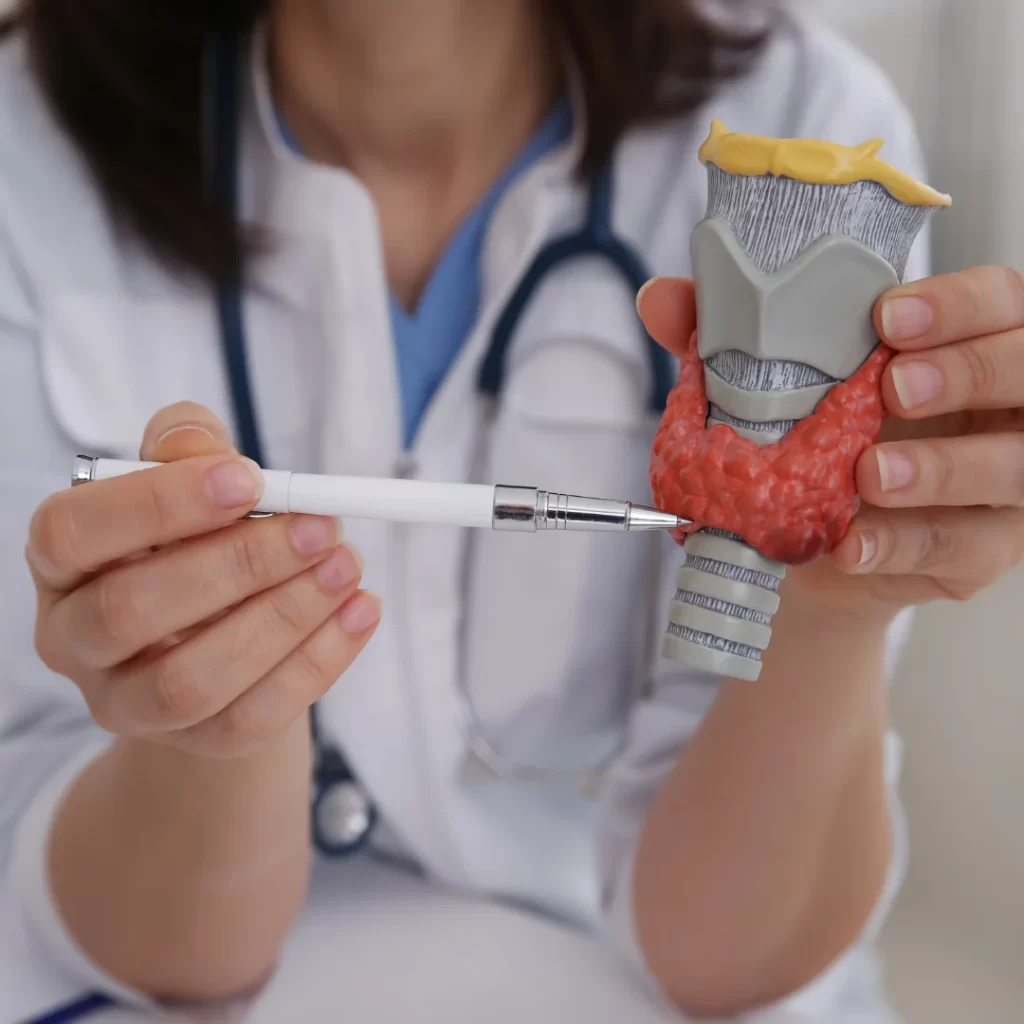If you’re managing diabetes and noticing unexpected changes in your blood sugar—despite sticking to your plan—it might be time to look beyond insulin and carbs. Your thyroid could be playing a bigger role than you think.
According to Dr. Lindsey VanDyke, DO, FACOI, FEAA, a board-certified endocrinologist and founder of Advanced Institute for Diabetes & Endocrinology in Mansfield, TX, thyroid function and glucose metabolism are deeply interconnected. Both overactive and underactive thyroid conditions can impact how your body uses insulin, burns energy, and stores fat—ultimately influencing your blood sugar control.
So let’s break it down.
How an overactive thyroid (hyperthyroidism) affects blood sugar
When your thyroid is producing too much hormone, everything in your body starts running in overdrive—your metabolism, heart rate, nervous system, and even how your body handles sugar.
Dr. VanDyke explains, “In hyperthyroidism, the body processes insulin faster, meaning it needs more insulin to keep moving glucose into cells. If you already have diabetes, this can make blood sugar harder to control.”
Common causes of hyperthyroidism include:
- Graves’ disease
- Toxic nodular goiter
- Thyroiditis (inflammation of the thyroid)
Even short-term thyroid inflammation (often viral in origin) can cause temporary hyperthyroidism that spikes your blood sugar.
When thyroid hormone levels are too high, you might notice:
- Sudden or unexplained weight loss
- Rapid heartbeat or palpitations
- Anxiety, irritability, or poor sleep
- Excessive sweating or heat intolerance
- Muscle weakness or tremors
“These symptoms can come on gradually, so it’s not always obvious,” says Dr. VanDyke. “Sometimes, a person’s diabetes control just gets worse—and that’s the first clue something deeper is happening.”
Too much thyroid hormone: risks for diabetics
Excess thyroid hormone can also:
- Metabolize diabetes medications faster, needing higher doses
- Cause faster glucose absorption, leading to sharp blood sugar spikes
- Accelerate the breakdown of stored sugars in the liver
Patients who are over-replaced with thyroid hormone—often unintentionally—can experience these effects even if they’re taking medication for hypothyroidism.
“I see patients all the time who’ve been prescribed high doses of thyroid hormones without proper follow-up,” says Dr. VanDyke. “Overtreatment can be just as harmful as undertreatment.”
How an underactive thyroid (hypothyroidism) affects blood sugar
Hypothyroidism, on the other hand, slows everything down—your metabolism, your digestion, your energy production, and even how your body processes medications.
When thyroid hormone levels are too low, your body becomes less efficient at breaking down glucose and insulin. While this can sometimes cause blood sugar to dip temporarily, the long-term effect is often weight gain, sluggish insulin metabolism, and eventually insulin resistance.
“In hypothyroidism, you might feel constantly tired, cold, or mentally foggy,” Dr. VanDyke says. “Your blood sugar might look better at first, but the weight gain and slowed metabolism can eventually worsen your diabetes.”
Common symptoms of hypothyroidism include:
- Fatigue and daytime sleepiness
- Dry skin, brittle hair, or hair thinning
- Weight gain, even with no change in diet
- Feeling cold all the time
- Depression, slowed thinking, or poor memory
- Constipation
- Heavy or irregular periods
If left untreated, hypothyroidism can make it harder to maintain a healthy weight and blood sugar control, particularly in people with pre-diabetes or metabolic syndrome.
When to check your thyroid
Dr. VanDyke recommends that anyone with diabetes or blood sugar issues have their thyroid checked at least once a year, or sooner if new symptoms arise.
“I always screen for thyroid function when someone’s glucose control suddenly changes without explanation,” she says. “Even mild thyroid dysfunction can impact how medications work or how the body uses insulin.”
The most sensitive initial test is TSH (thyroid stimulating hormone). Additional testing may include free T4, or thyroid antibodies, especially if autoimmune thyroid conditions like Hashimoto’s or Graves’ disease are suspected.
The bottom line
Thyroid health and blood sugar are tightly linked. If you have diabetes—or even just prediabetes—and something feels off, don’t overlook your thyroid. Symptoms can be subtle, and lab testing is simple, affordable, and covered by insurance.
“Whether you’re losing weight unexpectedly or struggling to lose it at all, it’s worth taking a closer look at your thyroid,” Dr. VanDyke says. “Hormones don’t work in isolation. One imbalance often affects many others.”
About dr. Lindsey Vandyke & AIDENDO
Dr. Lindsey VanDyke, DO, FACOI, FEAA, is a board-certified endocrinologist and the founder of the Advanced Institute for Diabetes & Endocrinology (AIDENDO) in Mansfield, TX. She specializes in diabetes, obesity, thyroid disease, hormone balance, and lifestyle-based care. As one of the first U.S. endocrinologists to offer radiofrequency ablation (RFA) for thyroid nodules, Dr. VanDyke is committed to helping patients avoid unnecessary surgery and take charge of their health with clarity and confidence.
For personalized hormone care in Mansfield and across Texas (virtual appointments available), visit www.aidendo.com or follow along at YouTube.com/@DrLindseyVanDyke
